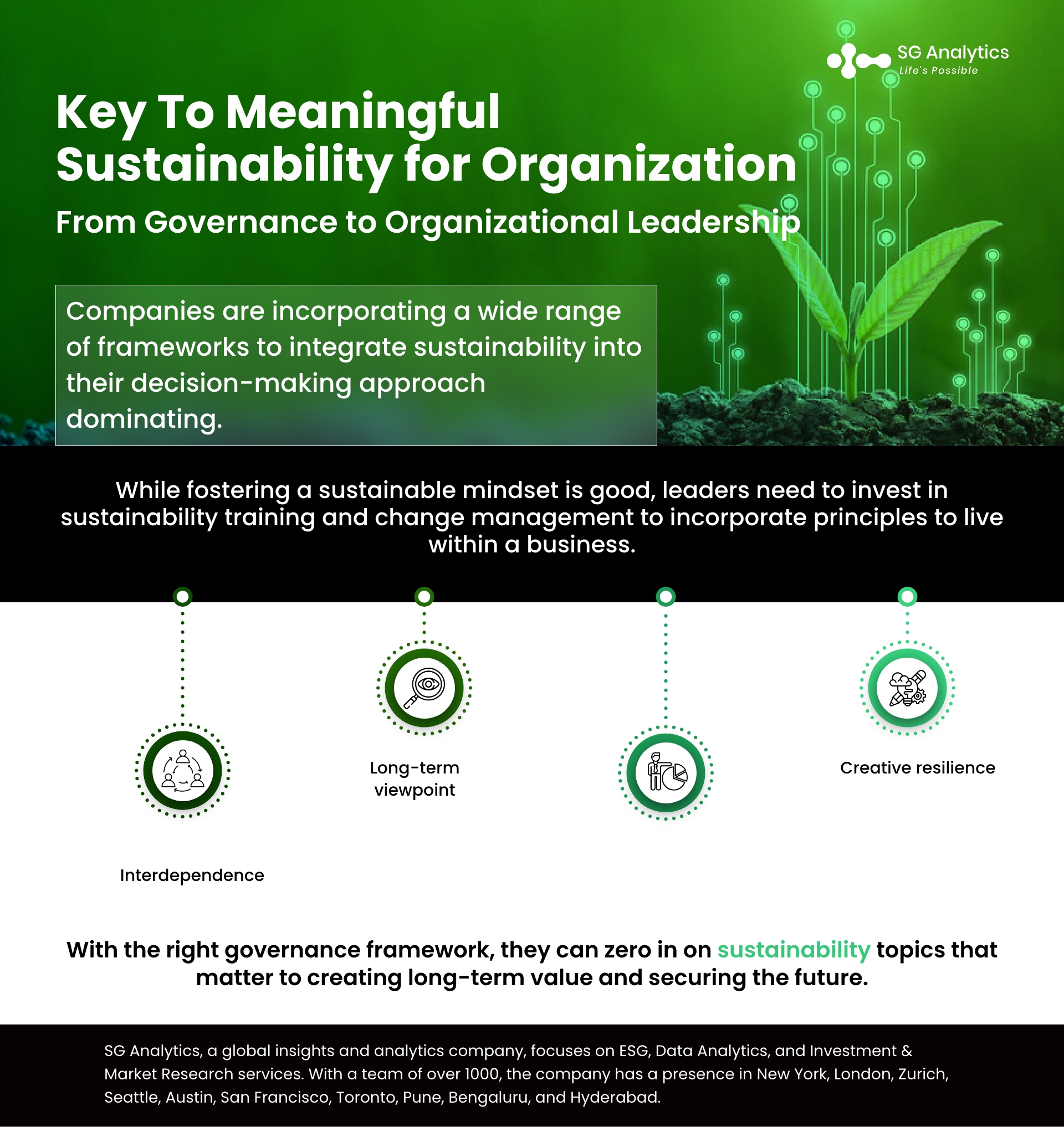For organizations, sustainability is no longer an issue of compliance but a strategic and operational one. Senior leaders are majorly focusing on integrating sustainability into their corporate strategy to support their sustainability efforts. While there is no right structure that applies to organizations, everyone needs a framework of their own that will integrate with their business structure and requirements.
A well-designed sustainability organization has all the capabilities required to capture the value and manage risks from sustainability systematically as well as practically.
However, company leaders need to understand that harnessing the true value of sustainable business stems from employees at every level. And integrating sustainability principles into everyday decisions requires time. Therefore, while fostering a sustainable mindset is good, leaders need to invest in sustainability training and change management to incorporate principles to live within a business.
Building and leading a green bond business and an enterprise ESG strategy requires the right mindset and sustainability program. And for this, companies have a big decision to make. To begin with, they need to identify and select issues under the broader sustainability umbrella that should be their organizations' responsibility, along with issues that are a part of their businesses. These concerns can range from designing new low-carbon businesses and commercializing green products to managing environmental compliance and ESG reporting.
Read more: Data-driven Sustainability Initiatives: Harnessing the Power of Data to Drive Change
While focusing on regulatory compliance and financial incentives, industry leaders must create a better future by addressing the challenges and fostering individual responsibility to drive profitable growth. The primary tools - regulation, incentives, and capital - are used to drive behavioral changes and enable environmental and social sustainability. However, these approaches are now proving much less effective due to their limitations.
- Regulation: When implemented effectively, regulations provide a framework that creates law and order. However, while regulation may help prevent harm, it does not maximize good. Rules help in establishing a minimum standard of acceptable conduct. To solve existential challenges such as climate change and socioeconomic inequality, organizations need to incorporate innovative measures of the highest order. And in addition to complying with the set regulations, enterprises also need to create a culture of leadership.

- Incentives: Incentives are employed to encourage sustainable practices that help in rewarding compliance and achieving certain milestones. However, these incentives can often inadvertently promote short-term thinking, enabling entities to focus on superficial changes to obtain rewards. This undermines the authentic nature of sustainability by misleading consumers and weakening the urgency for genuine change.
- Capital: Capital plays a critical role in driving sustainable practices. Today, investments in environmentally friendly technologies and initiatives are emerging as key components for progress. While the havoc caused by climate change is straining global resources, organizations are striving to implement measures to tackle the climate change crisis to reduce the impact of extreme weather crises in the future.
Read more: Building Data Trust: How Leaders are Nurturing and Measuring Stakeholder Trust for Growth
As companies are mobilizing to respond to the increasing sustainability concerns, they are also struggling with the differences between sustainability and other business problems in the trade-offs involving decision-making and governance processes. The critical pillars of success for building a sustainable framework include:
-
Knowing the priorities.
-
Investing in patience.
-
Integrating sustainable outlook in products.
-
Catalyzing processes and systems for change.
-
Building new partnerships.
Sustainability, along with environmental, social, and governance (ESG) issues, are affecting the way organizations do business. More and more companies and their investors are recognizing sustainability as a strategic preference that involves significant business risks and opportunities. However, only a few companies have organizational structures designed to treat sustainability as a material issue. Instead, sustainability activities have always been focused on investor relations, PR, and corporate social responsibility.

-
Interdependence: Viewing the framework as an interconnected system.
-
Long-term Viewpoint: Creating sustained value for current and future generations.
-
Ownership Mindset: Taking proactive responsibility to pursue leadership.
-
Creative Resilience: Developing perseverance to find innovative data solutions.
Read more: Fostering Diversity in Tech: The New Catalyst for Innovation and Growth
While regulation, incentives, and capital are critical components of a sustainability toolkit, relying on these mechanisms can lead to unintended consequences and outcomes. It has, therefore, become imperative for organizations to complement these mechanisms with the holistic leadership approach in order to overcome these pitfalls.
With sustainability becoming more strategic and operational, industry executives are leading the way in setting up sustainability frameworks that are right for their companies. The increase of activism of consumers for sustainable business practices is on the rise, thereby emerging as a key strategy for companies. This has enabled them to enforce measures and develop meaningful sustainability as well as environmental, social, and governance (ESG) strategies for the betterment of society. Through the multifaceted leadership approach, they are incorporating measures to drive sustainability and secure a resilient future for generations.
Key Highlights
-
Research has highlighted that effective governance and board oversight are critical for driving sustainability targets and outcomes.
-
Managing the tension between short as well as long-term sustainable priorities is key for organizations to companies recognize their sustainability governance journey and how far they have to go.
-
By focusing on board dynamics and reporting, organizations can develop a systematic, accountable, and authentic approach to sustainability.
Read more: An Ultimate Guide: ESG Data Sources for 2023

Moving Forward with Sustainability
Today, it has become more vital than ever for businesses to gain a systematic approach, better dynamics, and greater knowledge. Companies are incorporating a wide range of frameworks to integrate sustainability into their decision-making approach dominating.
Effective governance is a dynamic concept. However, incorporating the right structure is important to foster effective governance that is also dependent on having enough time as well as resources to devote to sustainability. The sustainability agenda is continuing to evolve, with a range of topics that mandate leadership, attention and time. These involve biodiversity, human rights in an organization's value chain, and workforce inclusion.
Organizations need to include measures to protect existing value, such as compliance requirements. However, this constantly moving agenda is emerging as a challenge for CEOs and board members. The risk is that a constantly changing agenda is leading companies to become more reactive rather than strategic. But being effective also requires the organization to inculcate the ability to foster new perspectives.
With the right governance framework, organizations can zero in on their sustainability topics that matter to the creation of long-term value and secure the future of their organization while safeguarding the future of its people.
SG Analytics, recognized by the Financial Times as one of APAC's fastest-growing firms, is a prominent insights and analytics company specializing in data-centric research and contextual analytics. Operating globally across the US, UK, Poland, Switzerland, and India, we expertly guide data from inception to transform it into invaluable insights using our knowledge-driven ecosystem, results-focused solutions, and advanced technology platform. Our distinguished clientele, including Fortune 500 giants, attests to our mastery of harnessing data with purpose, merging content and context to overcome business challenges. With our Brand Promise of "Life's Possible," we consistently deliver enduring value, ensuring the utmost client delight.
As a leading ESG service provider in the US, SG Analytics’ ESG data and research solutions are driven by secondary research to analyze ESG trends, metrics, news, and controversies. Contact us today if you are in search of generating deep insights and incorporating ESG (Environmental, Social, and Governance) integration and management solutions to boost your sustainable performance.









